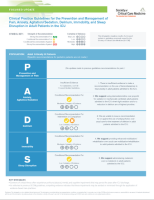


Citation: Lewis K, Balas MC, Stollings JL, et al. A focused update to the clinical practice guideline for the prevention and management of pain, anxiety, agitation/sedation, delirium, immobility, and sleep disruption in adult patients in the ICU. Crit Care Med. 2025 Mar 1;53(3):e711-e727.
Critically ill adults are at risk for a variety of consequential symptoms both during and after an ICU stay. Management of these symptoms can directly influence outcomes. These SCCM guidelines update and expand on SCCM’s 2018 Clinical Practice Guidelines for the Prevention and Management of Pain, Agitation/Sedation, Delirium, Immobility, and Sleep Disruption in Adult Patients in the ICU.
The task force issued five statements related to the management of anxiety (new topic), agitation/sedation, delirium, immobility, and sleep disruption in adults in the ICU. The task force issued conditional recommendations to use dexmedetomidine over propofol for sedation, provide enhanced mobilization/rehabilitation over usual mobilization/rehabilitation, and administer melatonin. The task force was unable to issue recommendations on the administration of benzodiazepines to treat anxiety, and the use of antipsychotics to treat delirium.
Guideline Type: Clinical
Related Resources:
Executive Summary: Prevention and Management of Pain, Anxiety, Agitation/Sedation, Delirium, Immobility, and Sleep Disruption in Adult Patients in the ICU
 |
Visual Abstract: Clinical Practice Guidelines for the Prevention and Management of Pain, Anxiety, Agitation/Sedation, Delirium, Immobility, and Sleep Disruption in Adult Patients in the ICU |
Section:
Strength:
Identifier:
There is insufficient evidence to make a recommendation on the use of benzodiazepines to treat anxiety in adult patients admitted to the ICU.
We suggest using dexmedetomidine over propofol for sedation in mechanically ventilated adult patients admitted to the ICU where light sedation and/or a reduction in delirium are of highest priorities.
Quality of evidence: Moderate
We are unable to issue a recommendation for or against the use of antipsychotics over usual care for the treatment of delirium in adult patients admitted to the ICU.
Quality of evidence: Low
We suggest providing enhanced mobilization/rehabilitation over usual care mobilization/rehabilitation to adult patients admitted to the ICU.
Quality of evidence: Moderate
We suggest administering melatonin over no melatonin in adult patients admitted to the ICU.
Quality of evidence: Low